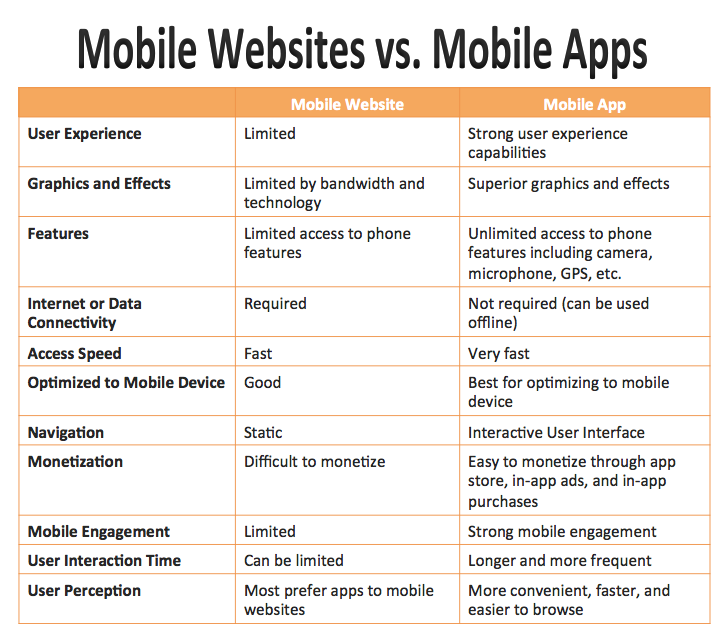Brands planning to establish their mobile presence prominent either consider mobile websites or mobile apps. There are different debates on the viability of mobile app vs mobile website. It is difficult to pit one against the other and derive a full-proof conclusion. Both are useful and have individual limitations. Few are of the opinion that a responsive website looks great on a mobile device or smartphone. Others believe that mobile app lets users perform a task that a website cannot.
Mobile apps can be installed or downloaded from the device-specific app stores like Google Play , Apple’s iTunes . The app can access data from the internet or it can download content so that users can access it when there is no internet connection. Mobile apps are specifically designed to be used on wireless devices like smartphone and tablets, with consideration to the features and constraints of mobile devices.
A mobile website is the responsive version of a desktop website. But, the look, feel and functionality is specific to be used on a mobile device. Web pages are optimized for smaller screen size so that users can access it from their smartphone or other mobile devices. The responsive websites display text, graphics, data and video and have various mobile-specific features.
The choice between mobile app vs mobile website depends on a number of factors like usability, functionality, cost and time.
9 Compelling Reasons to Build A Mobile App
Research proves that mobile users spend almost 86 percent of the mobile time on their mobile apps. They use mobile apps to engage with the brand and access daily information. Other findings state that 68 percent mobile users engage with brands through mobile apps. Below mentioned are the benefits of mobile apps for enterprises:
1. An increase in interaction and engagement– The interface of a mobile app makes the experience of users more interactive. Few important features of mobile apps are:
- Mobile apps are focused– Usually mobile apps are user-friendly, focused on a specific purpose and users can associate apps with a specific
- Interactive experience– Brands can engage with the users in a more interactive way. Different features like graphics, images, and icons make the experience interactive and memorable.
- Building Habits of users- Each mobile app has a wide range of functionality. Accessibility and usability of the mobile apps make users to get habituated with these.
The above-mentioned factors increase the engagement of users with mobile apps in comparison to mobile sites.
2. Access to native features– Each app has different features and functionality and the most important being compatibility with hardware of the device and its various features. A mobile app can leverage the native features of the device like:
- Push notification
- Device alerts
- Automatic updates
- Tap-to-call
- Camera
A mobile website might have few of the above-mentioned native features but integrating it with the device is always not effective.
3. Easy and Instant Notifications– In the last two decades, there has been a remarkable rise in the use of the mobile app as a communication tool for businesses. Email is used extensively to reach the users, but with time the click rates and open rates have dropped.
Two exciting alternatives for communication with app users are
- In-app notification– notification that a user receives when they open an app
- Push notification– users receive this notification on their device irrespective of the activity. The click-through rate of push notification is almost 40 percent.
These non-intrusive and instant notifications improve communication and boost conversion rate.
4. Improve Business Processes– Users can access instant information and support on a mobile app with just one click. Push alerts are sent to mobile devices to update users with new information. However, these alerts are not applicable for mobile sites, users of the latter have to depend on the emails.
A mobile app lets a user do everything that is otherwise possible with a mobile website but more fast and efficiently. Usually, users have to log in for accessing a mobile website and access any specific information.
5. Online and Offline access– Users can access information instantly both when the mobile app is online and offline. When offline, the updates will be stored locally and be reconnected when access to the internet. Another feature of the mobile apps is to update content online and then access it when offline. This is time-saving and perfect for users who are always on the go.
The mobile websites do not work offline, the website can be accessed through a browser.
6. High Level of Security– Data protection is important. Mobile apps can be easily integrated into to the existing security system of the mobile devices, and users can safely access, modify and share data.
Mobile apps use the management software, especially for the enterprise-level customers so that the latter can have better control of the apps and their functionality. This device management software is duly audited to ensure that they adhere to the security standards. Usually, MDMs are more secure than the websites.
7. Reduces Cost and Increases Productivity– Mobile apps improve communication between employees. Apps are handy in dealing with crucial and complex data, generating reports and charts. It is believed that apps can increase productivity by almost 20 to 40 percent. Since it is less time-consuming, businesses can generate additional revenue and opportunities.
On the other hand, Mobile websites are slow and it is at times difficult to deal with complex data which makes productivity take a back seat.
8. Better Branding Experience– A mobile app is distinct. Any company can experiment with the branding style with an app and offer a unique branding experience to users that is different from that of a website or general branding message.
Companies can add new transitions or customize features to the mobile apps based on user preferences to provide a better brand experience. Regular encounter with the apps improves brand visibility. The brand icon displayed on the mobile screen serves as the advertisement.
9. Rank high on SERP– A mobile app should rank high on the search engine result page (SERP). The in-app content is never overlooked by Google. Indexing the mobile apps let the search engine spiders index the app, as a result, the app will rank just like any other website.
To ensure that the app rank high ensures that the following are optimized with the respective app store:
- App Category
- App Title
- App Description
- Keyword Field
- Developer Name
A few Dynamic Success Metrics- Download Volume, Rating and Review and Links measure the success of SEO of an app.
 9 Business Advantages of a Mobile Website
9 Business Advantages of a Mobile Website
Now comes the Mobile or Responsive Website. Developing a responsive website is one of the most effective ways to establish the mobile presence of any brand. It is a viable means for businesses to communicate with the target users and an important part of the Mobile Outreach Strategy. Following are the business advantages of a mobile website:
1. Compatibility with Mobile Devices– Brands that have a responsive website can reach out to the users easily as it is compatible with different devices and operating systems. Whereas if you have native apps, it will require different versions of each device.
It is easy to integrate the URL of a mobile website into other mobile technologies like QR codes, SMS and Near Field Communication (NFC). This improves the accessibility of the mobile website to its target users.
2. Easy to Upgrade– A responsive website is dynamic and has the flexibility to update content in comparison to mobile apps. To upgrade a mobile website, just edit the content or design and the changes will be visible immediately.
However, updating a mobile app is an uphill task. First, inform the users about the update. Then users have to update their version of the app depending on the type of the device they are using.
3. Found Easily in Search Results– Major search engines- Google and Bing, prefer websites that offer good mobile experience while ranking them on the SERP. Google suggests that websites that are optimized for mobile, rank high in the local search result.
Moreover, if you have a responsive website, all efforts for SEO will be focused on a single website. There will be a unified SEO strategy applicable to multiple devices. Since there is only one site the chance of content duplication is low. All these factors contribute to high search engine ranking.
4. Share it fast– Mobile websites can be spotted in the search result findings. Whereas the apps are listed in specific app stores. It is easy for any user to access a responsive website on their mobile device.
Users can share the URL of websites through an email, SMS or social media posts. Even for the publishers, it is easy to direct the users to a particular website or blog by just sharing the URL.
5. Long Life cycle– Mobile websites are always available and accessible to the users. Different features integrated into the sites like live chat improves the user’s experience and these increase its shelf life. A research states that average life of mobile apps is short- even less than 30 days. If the app is both unique and useful the life cycle is long otherwise not. Only in the case of free apps, 20 percent of users return to use it after they download it.
6. Less Cost and Time– the Mobile website is cost-effective as the time required for developing a mobile website is low in comparison to that of a mobile app. There are standardized methodologies for developing and testing the responsive websites which make the process easy and less time-consuming.
7. Consolidate analytics of your website– A responsive site of a brand means you do not have to track the conversion path and user journey in the sales funnel of multiple sites. Rather advanced tools like Google Analytics can track the user journey and conversion rate of the brand through website across multiple devices.
It will be easy for businesses to monitor and analyze user journey across different touchpoints with a consolidated single report.
8. Save time for Site Management– It is easy to manage and maintain a single site rather than a website and an app. By using a single interface, content management, workflow, and layout tools website administrators can manage the content.
To provide a memorable multi-device experience to users, administrators can apply business logic to a CMS that minimizes the editorial efforts otherwise required of maintaining the website and an app. In short, maintaining a mobile website saves both time and money.
9. Better Support and Maintenance– For any business, the responsibility does not end with the launch of a website. Website maintenance and support play an important role. Regular upgrade, testing for bugs and fixing those, and continuous development is required. Expenses incurred for supporting and maintaining a responsive website in comparison to that of a mobile app.
Mobile App vs Mobile Website- Who wins?
Developing mobile website and mobile app incurs hefty expenditure. Both these channels have their individual pros and cons. Whether you want to develop a mobile website or a mobile app depends solely on the business objective and marketing goal. Whatever you are developing to make brand’s mobile presence prominent ake sure that you get optimum return on the investment.
If your goal is to provide an exemplary user experience and instant access to information then a mobile app is a safe bet. Again, if your business’s aim is to establish a mobile presence and deliver content to users then, a mobile responsive website is apt for you. It can be easily maintained, shared and even be found on the search engine. However, it is important to understand that a responsive website and a mobile app is not mutually exclusive. There are many organizations who have both responsive website and mobile app to accommodate the specific goals of your business.



